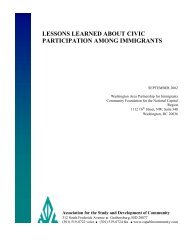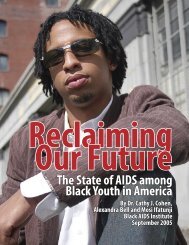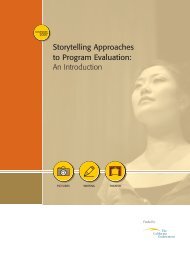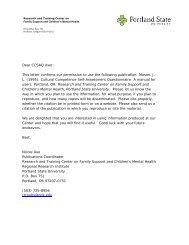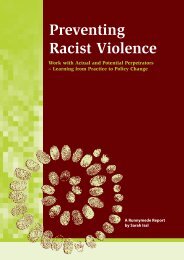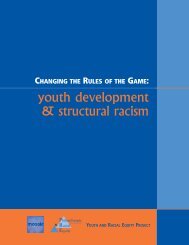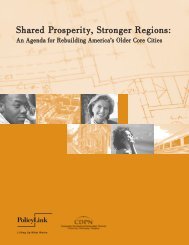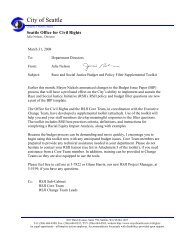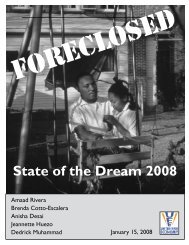Communities, he has unique perspective on howequity issues are viewed <strong>in</strong> diverse arenas. “Thelanguage <strong>of</strong> regional equity is still a challenge toengag<strong>in</strong>g bus<strong>in</strong>ess or others w<strong>in</strong>n<strong>in</strong>g under thecurrent system. Can we demonstrate the w<strong>in</strong>-w<strong>in</strong>scenarios that will lead to the nontraditional allianceswe need to ga<strong>in</strong> needed reforms?”john a. powell identifies the very essence <strong>of</strong> regionalequity as <strong>in</strong>herently challeng<strong>in</strong>g. In his role asdirector <strong>of</strong> the Kirw<strong>in</strong> Institute on Race <strong>and</strong>Ethnicity, Moritz College <strong>of</strong> Law, The Ohio StateUniversity, he fully underst<strong>and</strong>s the complexitywhich a regional equity agenda can present. “Most <strong>of</strong>our work relates to <strong>in</strong>dividual projects,” he observes.“This does not allow us to show the connectionbetween issues, which is <strong>in</strong> truth the beauty <strong>of</strong>regional equity—it provides solutions that blend theissues <strong>and</strong> focuses on“Litigation. Organiz<strong>in</strong>g.Advocacy. When thesethree act together, the mostsignificant change occurs.They can really play eachother out <strong>in</strong> a very savvyway.”— Myron Orfieldfairness. But the casecan be hard to makefor such efforts.”Orfield sees thecomb<strong>in</strong>ations <strong>of</strong> skillsneeded to advanceregional equity as amajor challenge tobalance, but one wellworth the reward.“Litigation.Organiz<strong>in</strong>g. Advocacy. When these three act together,the most significant change occurs. They can really playeach other out <strong>in</strong> a very savvy way. Look at the 1964Civil Rights Act, the 1965 Vot<strong>in</strong>g Rights Act, the 1968Fair Hous<strong>in</strong>g Act. The environmental justicemovement, gay rights. When th<strong>in</strong>gs happen that affectequity, all three are happen<strong>in</strong>g <strong>in</strong> concert. Right now,we have a lot <strong>of</strong> organizations utiliz<strong>in</strong>g a s<strong>in</strong>gle tool,ma<strong>in</strong>ly because that is all they can manage.”While progress is spread<strong>in</strong>g, the pace <strong>of</strong> its discoveryis modest. “Only a small group really underst<strong>and</strong>s<strong>and</strong> effectively advocates for regional equity,”Anthony po<strong>in</strong>ts out. “There are many challenges toachiev<strong>in</strong>g a more broad-based underst<strong>and</strong><strong>in</strong>g.” Acritical element <strong>in</strong> build<strong>in</strong>g the awareness <strong>of</strong> themovement is <strong>in</strong>creased leadership development forpolicy change. Pastor applauds organizationsstepp<strong>in</strong>g up to fill this need. “Some <strong>of</strong> the mosteffective groups work<strong>in</strong>g on regional equity haveleadership development programs. They areconscious about political <strong>and</strong> economic education.They place debates <strong>in</strong> the context <strong>of</strong> broader issues.”“In some ways, public space is probably one <strong>of</strong> themost important issues fac<strong>in</strong>g the world,” says powell.“The control <strong>of</strong> space is important <strong>in</strong> how wedistribute opportunity <strong>and</strong> burdens. So we have to becareful that regionalism is not seen simply as anurban American movement—it is go<strong>in</strong>g to becomemore important for everyone. We have to underst<strong>and</strong>how elements <strong>of</strong> regional equity play out <strong>in</strong> differentcontexts.”Blackwell raises a sensitive issue that faces themovement. “There is another major challenge: theleaders <strong>of</strong> this field need foundations to stick withthem. This change will not come <strong>in</strong> a day, s<strong>of</strong>oundations need to be with them, truly committed.Leaders need long-term, patient capital, skill,visibility, <strong>and</strong> clout. Some foundations arerecogniz<strong>in</strong>g the power <strong>of</strong> the regional framework.”F<strong>in</strong>ally, Anthony succ<strong>in</strong>ctly states perhaps thegreatest challenge ahead. “At heart, regional equity isabout issues still difficult for people <strong>and</strong> <strong>in</strong>stitutionsto come to honest terms with: race <strong>and</strong> class.”Strengthen<strong>in</strong>g the MovementThere is clarity among leaders <strong>of</strong> the movementabout what it will take to advance regional equity <strong>in</strong>the com<strong>in</strong>g years. Blackwell sees promise <strong>in</strong> thedirection philanthropy has taken <strong>in</strong> its <strong>in</strong>vestment <strong>in</strong>equity, but knows it will take more than that alone.“We need foundations to support anchor <strong>in</strong>stitutions<strong>in</strong> local communities <strong>and</strong> national <strong>in</strong>termediaries toweave the big story. Journalists who can beg<strong>in</strong> tochange the conversation at the local level to alert thenation that someth<strong>in</strong>g is afoot. Elected <strong>of</strong>ficials tobeg<strong>in</strong> to build a new regional agenda. Academics toprovide <strong>in</strong>tellectual underp<strong>in</strong>n<strong>in</strong>gs.” Orfield po<strong>in</strong>tsto even more fundamental change that needs tooccur. “We have to weave the threads.Fundamentally, the movement has to cont<strong>in</strong>ueembrac<strong>in</strong>g the objectives <strong>of</strong> civil rights. We neednoth<strong>in</strong>g less than the racial, social, <strong>and</strong> economic<strong>in</strong>tegration <strong>of</strong> society. We have to <strong>in</strong>fluence thosewho change the rules <strong>of</strong> the game.”Pastor <strong>of</strong>fers some concrete options for mak<strong>in</strong>g thathappen. “By develop<strong>in</strong>g the capacity <strong>of</strong> themovement, by support<strong>in</strong>g leadership developmentprograms <strong>and</strong> <strong>in</strong>stitution build<strong>in</strong>g, through peer-to-7 Funders’ Network for Smart Growth <strong>and</strong> Livable Communities
peer work, we can reestablish a significant role forresearch—the <strong>of</strong>ten forgotten component <strong>of</strong> themovement as we move to action,” he says. “Part <strong>of</strong>what drove the movement was some pretty<strong>in</strong>terest<strong>in</strong>g studies on how <strong>in</strong>equity plays out <strong>in</strong>communities. Research <strong>and</strong> organiz<strong>in</strong>g need to goh<strong>and</strong> <strong>in</strong> h<strong>and</strong>.” Anthony sees future success tied tothe people the movement can serve. The broaden<strong>in</strong>g<strong>in</strong>terest <strong>of</strong> the middle class <strong>in</strong> improv<strong>in</strong>g regionalequity must be articulated <strong>and</strong> effectivelycommunicated, because the language used to discussregional equity concepts is not yet accessible enoughto wide audiences.A Role for Philanthropy <strong>and</strong> Other Partners“There really are these three k<strong>in</strong>ds <strong>of</strong> basicregionalisms: economic, environmental, <strong>and</strong>regional equity, which positions itself to be able toaddress better social disparity,” Pastor postulates.“Foundations can be <strong>in</strong>stitutions that ensure there isa serious equity component. They can <strong>in</strong>creaseengagement, build capacity, encourage <strong>in</strong>vestment,reach bus<strong>in</strong>ess groups. These are th<strong>in</strong>gs foundationscan br<strong>in</strong>g forward to the table; they can weavetogether <strong>in</strong>stitutions.”Starrett po<strong>in</strong>ts to several steps that he has seenfoundations take <strong>in</strong> his organization’s role as aphilanthropic aff<strong>in</strong>ity group committed to smartergrowth policies <strong>and</strong> practices <strong>and</strong> equity issues. “Weknow foundations can provide direct, core operat<strong>in</strong>gsupport for proactive organiz<strong>in</strong>g, effective<strong>in</strong>termediaries, <strong>and</strong> <strong>in</strong>stitutions that generatestrategic applied research. We know that this k<strong>in</strong>d <strong>of</strong>grantmak<strong>in</strong>g works. Now we need to see more <strong>of</strong> itthroughout philanthropy.”Anthony agrees that there is a specific role forphilanthropy <strong>in</strong> advanc<strong>in</strong>g regional equity. “Ageneration <strong>of</strong> regional equity demonstrations thatconnect a policy framework to outcomes <strong>and</strong> largerconstituencies is develop<strong>in</strong>g. These demonstrationscan be used to convene actors, build networks,encourage cross-issue collaboration, <strong>and</strong> take race<strong>and</strong> class out <strong>of</strong> the closet.“The political climate <strong>of</strong> the day supports thedom<strong>in</strong>ance <strong>of</strong> narrow <strong>in</strong>terests that underm<strong>in</strong>ecommunity,” notes powell. “<strong>Regional</strong> equity is say<strong>in</strong>gthat we have to have a collective shared communitythat exists consistently. Public education,<strong>in</strong>termediaries, <strong>and</strong> other organizations that connectequity to the greater public good can get crucialsupport from philanthropy.”Foundations are not the only critical partner as themovement goes forward. As Blackwell notes,“<strong>Regional</strong> equity must connect to the <strong>in</strong>terest <strong>of</strong> theprivate sector <strong>in</strong>order to besuccessful. Thereforedur<strong>in</strong>g this nextperiod, we must bebuild<strong>in</strong>g thoserelationships, f<strong>in</strong>d<strong>in</strong>gthe language to speakto bus<strong>in</strong>ess …craft<strong>in</strong>g w<strong>in</strong>-w<strong>in</strong>scenarios becomesessential.” Part <strong>of</strong>that process will bemak<strong>in</strong>g a strongercase that the policies<strong>and</strong> strategiesembraced by regionalequity actually work. “We have to demonstrate howwe measure regional equity statistically,” declaresRusk, an accomplished researcher <strong>in</strong> his own right.“We have to br<strong>in</strong>g some real rigor to def<strong>in</strong>e what weare try<strong>in</strong>g to do—are we gett<strong>in</strong>g there?” Pastoragrees. “This movement has made quite a lot <strong>of</strong>progress. A critical reflection now opens up the wayfor a lot <strong>of</strong> excit<strong>in</strong>g work.”“Foundations can be<strong>in</strong>stitutions that ensurethere is a serious equitycomponent. They can<strong>in</strong>crease engagement,build capacity, encourage<strong>in</strong>vestment, reach bus<strong>in</strong>essgroups. These are th<strong>in</strong>gsfoundations can br<strong>in</strong>gforward to the table; they canweave together <strong>in</strong>stitutions.”—Manuel PastorBlackwell <strong>of</strong>fers a caution as the work goes forward.“Issue-based agendas will not ultimately procure thegroundswell needed for transformation to a societywhere everyone can participate <strong>and</strong> prosper. <strong>Regional</strong>equity has to catch fire the way the suburbanization<strong>of</strong> America did, or the environmental movement. Weneed a vision that builds a society that focuses oncaptur<strong>in</strong>g the best everyone has to <strong>of</strong>fer. That is astall an order as it gets. The <strong>in</strong>termediate steps comeout <strong>of</strong> our work today, but ultimately that is whatwill have to happen.”Part II: Perspectives on Advanc<strong>in</strong>g <strong>Regional</strong> <strong>and</strong> Neighborhood Equity8
- Page 1 and 2: Stories of Philanthropic Leadership
- Page 3 and 4: Signs of Promise:Stories of Philant
- Page 5 and 6: Funders’ Network for Smart Growth
- Page 7 and 8: (II. B.)(II. C.)Turning Neighborhoo
- Page 9 and 10: PART I:IntroductionThe Purpose of t
- Page 11 and 12: social justice issues as they relat
- Page 13: PART II:Perspectives on Advancing R
- Page 17 and 18: Annie E. Casey FoundationBaltimore,
- Page 19 and 20: neighborhoods into healthy ones—g
- Page 21 and 22: Charles and Helen Schwab Foundation
- Page 23 and 24: Section 1:Promoting Equitable Publi
- Page 25 and 26: I. A. BUILDING POWER AND GIVINGVOIC
- Page 27 and 28: policy advocates. In 2002, Milwauke
- Page 29 and 30: in Los Angeles, Ford’s Anthony no
- Page 31 and 32: I. B. PROMOTING COALITIONSTO ADVANC
- Page 33 and 34: Yet the interpersonal dynamics of c
- Page 35 and 36: guidelines. “Many of the member o
- Page 37 and 38: Funder InterestThe EPA supported th
- Page 39 and 40: I. D. DEMONSTRATING THESTRUGGLE FOR
- Page 41 and 42: Richmond, Calif.The second regional
- Page 43 and 44: through policy reform at the local
- Page 45 and 46: I. E. BUILDING COALITIONTHROUGH KNO
- Page 47 and 48: organizing project, the Connecticut
- Page 49 and 50: and businesses are quantified in a
- Page 51 and 52: I. G. REVITALIZING WHILEASSURING DI
- Page 53 and 54: In the late 1990s, the city of Albu
- Page 55 and 56: I. H. A TRAVEZ DE LA FRONTERA:LAND
- Page 57 and 58: The International Community Foundat
- Page 59 and 60: I. I. MOBILIZING ACTION FORREGIONAL
- Page 61 and 62: To meet all of these objectives, th
- Page 63 and 64: efforts. And with each public plann
- Page 65 and 66:
pattern of disproportionate transpo
- Page 67 and 68:
Clinica de la Raza identify this cr
- Page 69 and 70:
Contact PeopleCarl AnthonyActing Di
- Page 71 and 72:
Section 2:Making All Neighborhoods
- Page 73 and 74:
II. A. REACHING BEYONDHOUSING TO IM
- Page 75 and 76:
A local resident receives the keys
- Page 77 and 78:
East Baltimore community and the Jo
- Page 79 and 80:
example, adjacent to the EBDI area,
- Page 81 and 82:
II. C. YIELDING REGIONALBENEFITS TH
- Page 83 and 84:
is using transit-oriented developme
- Page 85 and 86:
financing and innovative, forward-t
- Page 87 and 88:
The Row House Community Development
- Page 89 and 90:
II. E. COUNTERING THE PERFECTSTORM:
- Page 91 and 92:
funded community programs, includin
- Page 93 and 94:
housing developments and commercial
- Page 95 and 96:
owned enterprises, totaling $8.5 mi
- Page 97 and 98:
LOAN GUARANTEESSection 3:Connecting
- Page 99 and 100:
III. A. MAKING HOUSING ANOPPORTUNIT
- Page 101 and 102:
A new report from the National Hous
- Page 103 and 104:
The Straphangers Campaign was found
- Page 105 and 106:
Funder InterestThe Straphangers Cam
- Page 107 and 108:
or increase poverty. Whether direct
- Page 109 and 110:
The Regional Plan Association then
- Page 111 and 112:
multi-stakeholder effort composed o
- Page 113 and 114:
director with LISC. No one set of s
- Page 115 and 116:
12 western Louisville neighborhoods
- Page 117 and 118:
III. E. UNITING THREE STATESFOR ONE
- Page 119 and 120:
increased their personal wealth by
- Page 121 and 122:
summary evaluation of MSDI found th
- Page 123 and 124:
method alone was strong enough to m
- Page 125 and 126:
consistent body of work. The Counci
- Page 127 and 128:
3) Issues Need to be ConnectedThe f
- Page 129 and 130:
PART V:Glossary of TermsThe terms d
- Page 131 and 132:
Regional and neighborhood equity. A
- Page 133 and 134:
Tijuana River Reserve, California:h
- Page 135 and 136:
Sargent Shriver National Center on
- Page 137:
1500 San Remo Avenue • Suite 249





